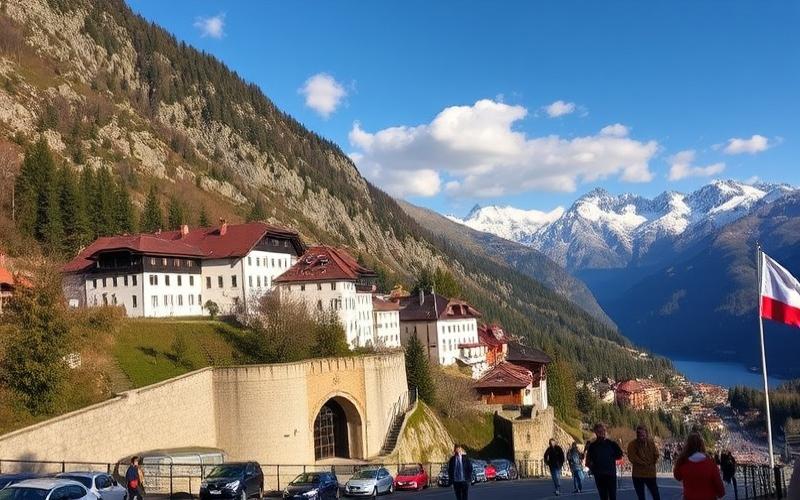
 Published on and written by Cyril Jarnias
Published on and written by Cyril Jarnias
Nestled Between Switzerland and Austria, This Tiny Principality Offers an Idyllic Setting for Expatriates
Liechtenstein, famous for its breathtaking alpine landscapes and exceptionally high quality of life, presents an appealing choice for those looking to embrace a new culture while enjoying a safe and stable environment.
Good to Know:
However, navigating the administrative specifics of this country can be complex. You’ll need to have high salaries (> €5,000) or substantial assets (>€30 million). Without these, we do not recommend relocating to this country.
This article aims to provide a clear and detailed guide on how to settle in Liechtenstein as an expatriate, covering crucial aspects such as:
- Housing
- Job Market
- Administrative Procedures
To facilitate your transition into this European green haven.
Preparing Your Move to Liechtenstein
Preparing Your Move to Liechtenstein
Essential Administrative Procedures:
- Before Departure:
- Apply for a visa and/or residence permit depending on your nationality. For nationals of the European Economic Area (EEA), the number of permits is limited by annual quotas, allocated either by lottery or government decision. Swiss citizens also have a specific quota.
- Gather necessary documents: passport, proof of sufficient financial means, health insurance certificate, and proof of accommodation.
- Arrange for change of address with the relevant authorities in your home country.
- Upon Arrival:
- Submit the official residence permit application to the Migration and Passport Office (Ausländer- und Passamt).
- Register with the local tax authorities (Steuerverwaltung) to establish tax residency.
- Complete registration formalities with the municipality.
Financial Aspects to Consider:
| Item | Details |
|---|---|
| Cost of Living | Very high (housing, food, and common services) |
| Bank Account | Easier to open with a residence permit and local address |
| Insurance | Mandatory health insurance; consider home/auto insurance |
Practical Tips for Easier Integration:
- Language:
- German is the official language. Prior learning or a refresher course greatly speeds up professional and social integration.
- Housing:
- The rental market is limited; start searching as early as possible through local agencies or specialized platforms.
- Cultural Integration:
- Participating in local community activities allows for better adaptation to the country’s customs.
Useful Resources and Contacts:
- Expatriate Organizations
- International clubs present in the region
- Social media groups dedicated to expatriates in Liechtenstein
- Public Services
- Ausländer- und Passamt (Migration)
- Steuerverwaltung (Taxes)
- Online Platforms
- Local real estate portals
- Support forums for newcomers
Key Points to Remember:
It is essential to anticipate all your procedures, especially administrative ones, to avoid any blockages related to the very restrictive visa/permit quotas.
Planning a realistic budget that accounts for the high cost of housing and daily expenses greatly facilitates your settlement.
Getting involved quickly in local life—including language learning—optimizes your chances of successful integration.
Meticulous planning remains the best ally for a successful move to Liechtenstein.
Good to Know:
Before settling in Liechtenstein, ensure you have completed essential administrative formalities, such as obtaining a visa if needed and registering with local authorities upon arrival. Financially, prepare for a high cost of living and plan to open a local bank account to facilitate transactions. Subscribing to health insurance is essential given the country’s medical system. Learning German, the official language, will not only help you integrate more easily but also navigate daily procedures. For housing, explore dedicated online platforms and consider proximity to services and your workplace. Engage with expatriate groups for community support and discover resources offered by public services. A carefully prepared budget will ensure a smooth transition while accounting for unexpected expenses.
Essential Steps Upon Arrival
Administrative Formalities Upon Arrival in Liechtenstein:
- Registration with Local Authorities: Anyone wishing to reside in Liechtenstein must register with their municipality of residence within days of arrival. This step is mandatory for everyone, regardless of nationality.
- Residence Permit Application: A permit is required for any stay in Liechtenstein. Even citizens of the European Economic Area (EEA) are subject to a quota system and must obtain specific authorization. The application typically includes proof of accommodation, employment or self-employment, as well as legalized and translated personal documents if necessary.
Good to Know:
Obtaining a permit may involve creating a company or submitting a detailed application to the government depending on your situation.
Opening a Local Bank Account:
- Visit a branch with valid ID, a rental contract or proof of local address, and the residence permit (or receipt of application).
- Sometimes provide proof of professional or academic activity.
- Banks may require a preliminary interview to verify regulatory compliance.
Health Services Registration and Health Insurance:
- Subscribing to health insurance is mandatory upon settlement.
- Choose an insurer approved locally; some providers also offer international plans suitable for expatriates.
- Once you receive the personal number assigned during initial administrative registration, you should then:
- Inform the selected insurer
- Submit this choice to the competent authorities
Housing Search and Rental: Practical Tips
| Key Steps | Specific Tips |
| Search | Use local real estate agencies, specialized platforms |
| Rental Application | Prepare documents: ID, proof of income/employment |
| Security Deposit | Typically equivalent to 1–3 months’ rent |
| Contract | Read conditions carefully (included/excluded charges…) |
Practical Tip: Demand is high in certain segments (studios/apartments), so start your search several weeks before arrival.
Language Importance for Social Integration
Learning German, the country’s official language, greatly facilitates all your administrative and professional procedures as well as daily interactions with locals. Courses are offered by various local associations or public institutions; they also provide an excellent way to expand your social circle.
Useful Local Resources and Organizations for Expatriates:
- Municipal offices (“Gemeinde”) for residential formalities
- National Migration Office (“Migrationsamt”)—support on visas/permits
- Real estate agencies specializing in international relocation
- Franco-German cultural associations promoting meetings among newcomers
Practical Tips for Finances & Cultural Adaptation:
Financial Management:
- Prefer a local bank account to reduce daily banking fees
- Consult an accountant before departure regarding potential cross-border taxation
Cultural Adaptation:
Good to Know:
Understanding Liechtenstein’s social norms such as strict punctuality for professional/private appointments
Respecting discretion in public spaces
Active participation in local community life facilitates rapid integration
For any long-term settlement in Liechtenstein, thorough preparation in advance significantly simplifies every administrative, financial, and social step.
Integrating and Thriving in the Local Community
To understand and respect local customs in Liechtenstein, it’s essential to follow several key steps:
- Understanding the Importance of Traditions and Cultural Festivals: Liechtenstein is rich in traditions, such as National Day on August 15th, Funkensonntag (Bonfire Sunday), and Christmas markets. These events offer an authentic experience and allow connection with the local community.
- Getting Involved in Community Activities:
- Local Events: Participate in festivals, fairs, and traditional celebrations to better understand the culture.
- Sports and Arts Clubs: Join local groups for physical or artistic activities, promoting social interactions.
- Municipal Meetings: Attend these meetings to stay informed about local projects and contribute to community life.
- Learning the Official Language:
- Available Resources: Use online courses, books, and apps to learn German, Liechtenstein’s official language.
- Daily Interactions: Practice the language in shops, cafes, and social interactions to improve understanding and communication.
- Familiarization with the Education System and Local Institutions:
- For those coming with family, it’s crucial to inquire about schools, daycare, and available educational support services.
- Local Institutions: Understand how public services, libraries, and community centers operate for easier integration.
- Building Social Networks:
- Getting to Know Neighbors: Organize informal gatherings, like barbecues or evening events, to get acquainted with neighbors.
- Online Platforms and Expatriate Events: Use social media and participate in events organized by expatriates to meet new people and build social connections.
Here are some practical tips to facilitate integration:
| Activity | Description | Benefits |
| Participating in Local Festivals | Discover traditions and culture | Authentic experience, social interactions |
| Joining Local Clubs | Practice physical or artistic activities | Skill improvement, social relationships |
| Attending Municipal Meetings | Stay informed about local projects | Community contribution, understanding local decisions |
For building social networks, here are some tips:
- Use online platforms to connect with other expatriates and local residents.
- Participate in events organized by expatriates to meet new people with similar interests.
- Organize gatherings with neighbors to create a friendly and welcoming environment.
Good to Know:
Integrating into Liechtenstein primarily means understanding and respecting its local customs, where traditional holidays like Staatsfeiertag are essential. Participate in community activities to build relationships, whether through sports clubs, artistic circles, or municipal meetings, which are valuable opportunities for interaction. Learning German, the official language, is crucial, and courses are offered by local institutions to facilitate adaptation. If moving with family, taking time to understand the local education system can be beneficial for your children. Meet your neighbors by participating in events for newcomers or joining online platforms dedicated to expatriates, which will help you establish a strong social network and share experiences with others in similar situations.
Visa, Housing, and Formalities: Keys to Success
Types of Visas and Permits for Expatriates
- Citizens of the European Economic Area (EEA)
Stay in Liechtenstein is subject to annual quotas. Permits are allocated either by lottery or by the government under two categories:
Spouses and children under 21 can also obtain residence rights. - Swiss Citizens
Note: The visa or permit acquisition process can be lengthy due to strict quotas.
Essential Administrative Procedures
- Submit application to competent authorities with supporting documents:
- Register with the municipal registry upon arrival in the country.
- Respect legal deadlines for renewing your permit or reporting any changes (marital status, address…).
Local Real Estate Market & Housing Options
Actual prices have increased significantly in recent years; life in Vaduz remains more expensive than in rural areas.
| Type | Average Monthly Rent | Average Purchase Price |
|---|---|---|
| Studio | CHF 1,000 | CHF 535,000 |
| 2-Room Apartment | CHF 1,100 | N/A |
| 3-Room Apartment | CHF 1,400 | CHF 495,000 |
| Family Home* | From ~€1,340 | Up to ~€12,000/m² |
Options Accessible to Newcomers
Furnished or unfurnished rental through local real estate agencies, specialized platforms, municipal listings.
Purchase possible but very competitive; professional assistance is highly recommended.
Financial Aspects Related to Housing
- Security deposit required (typically three months)
- Additional costs: monthly rental charges, property tax if purchasing.
- Limited access to property for some foreigners depending on migration status.
Practical Tips for Successful Settlement
- Contact a local real estate agency early.
- Plan a substantial budget given the high level of rents/purchases.
- Subscribe to mandatory home insurance upon signing lease/purchase deed.
- Register with municipal authorities within a week of arrival.
Useful Resources:
- Municipal services (“Gemeinde”) for all local administrative questions
- National and regional real estate platforms
- Agencies specializing in expatriate support
Integration into the Local Community
To integrate quickly:
- Learning some German/Swiss German significantly facilitates daily and social procedures.
- Participate in local community events (village festivals, sports/cultural associations).
- Connect with the existing international network through clubs or professional networks.
The welcome is known to be warm but discreet; voluntary involvement always accelerates integration.
Tax Regulations & Essential Insurance
- Mandatory annual tax declaration even for foreign residents;
- Health insurance recognized in Switzerland/Liechtenstein mandatory;
- Liability insurance recommended;
- Inquire about your tax regime based on resident/non-resident status to avoid surprises.
For any complex procedure or specific need: consult an agency specializing in expatriation to Liechtenstein that can direct you to the right official (“Landesverwaltung”), legal, and banking contacts.
Arm yourself with patience regarding strict visa/permit quotas and high real estate market tension: anticipation = key!
Good to Know:
In Liechtenstein, expatriates can choose from various types of visas, including residence permits for employed workers and self-employed workers. It’s crucial to understand the necessary steps to obtain these visas, which include submitting documents proving your employment or business and visa validation through local authorities. The real estate market is limited and competitive, with housing options ranging from modern apartments in urban centers to houses in outlying municipalities; plan a substantial budget for rent, often with additional fees. For integration, it’s recommended to participate in community events and join expatriate groups. Legal settlement also requires compliance with administrative formalities such as registration with tax authorities and subscribing to health and home insurance. Useful resources include government websites, local real estate agencies, and expatriate support services that offer advice on daily life and tax obligations.
Residing in this country will require a job with a good salary (minimum €5,000 per month) or significant resources (assets >€30 million), without which it will be complex to settle.
Disclaimer: The information provided on this website is for informational purposes only and does not constitute financial, legal, or professional advice. We encourage you to consult qualified experts before making any investment, real estate, or expatriation decisions. Although we strive to maintain up-to-date and accurate information, we do not guarantee the completeness, accuracy, or timeliness of the proposed content. As investment and expatriation involve risks, we disclaim any liability for potential losses or damages arising from the use of this site. Your use of this site confirms your acceptance of these terms and your understanding of the associated risks.

























